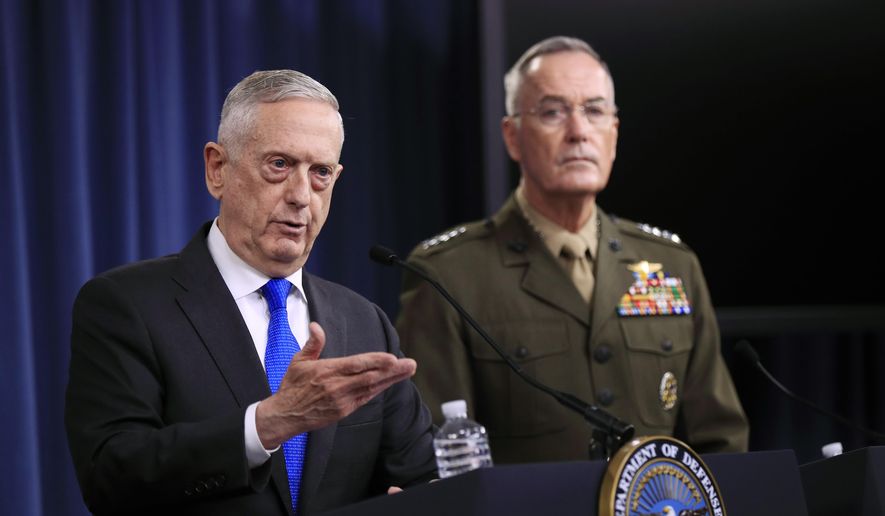The Trump administration will continue providing military support to the Saudi and Emirati-led coalition battling Iran-backed insurgents in Yemen, despite allegations by United Nations investigators that coalition forces have conducted attacks “that may amount to war crimes.”
During a rare Pentagon press conference Tuesday, Defense Secretary James Mattis said U.S. officials “recognize the complexity” of the situation, but have no plans to shift their policy toward Yemen in the face of a scathing review by experts commissioned by the U.N. Human Rights Council.
In an initial report issued to the council Tuesday, the experts claimed the militaries of Saudi Arabia and the United Arab Emirates, as well as forces loyal to Yemen’s besieged government, may be responsible for war crimes including rape, torture, disappearances and “deprivation of the right to life.”
The report separately said that Iran-backed rebels — known as the Houthis — in Yemen may also be responsible for carrying out such crimes in the three year conflict that has left more than 10,000 people dead, although specific details relating to the allegations against the rebels were not included.
The U.N. experts broadly called on the international community to “refrain from providing arms that could be used in the conflict” — a plea that The Associated Press characterized as a reference to U.S. and British military support for Saudi and Emirati coalition, and Iranian support for the Houthis.
At the Pentagon, Mr. Mattis told reporters that U.S. officials are continuously reviewing Washington’s policy in Yemen, but intend to stay the course in supporting the Sunni Muslim Arab military coalition battling the Shiite Muslim Houthis.
“We support our partner Saudi Arabia’s sovereign right to self-defense, and we recognize the end of the conflict requires a political solution,” Mr. Mattis said.
The U.N. report, meanwhile, took specific aim at the Saudi-led coalition’s use of seemingly indiscriminate air power in Yemen. The report chronicled the damage from coalition airstrikes, the single most lethal force in the fighting, over the last year, including one strike in northern Yemen this month, in which more than 50 people were killed, including 40 children.
American military assets have provided aerial imagery and other intelligence to their Saudi counterparts to assist in planning airstrikes against Houthi positions. U.S. officials most recently offered such support during a June coalition offensive to retake the strategically critical Yemeni port city of Hodeidah from Houthi control.
Mr. Mattis acknowledged that Riyadh’s heavy-handed bombing tactics have triggered consternation inside the Pentagon, but also pushed back against critics who claim the Saudis are carrying out indiscriminate strikes. He appeared to speak specifically of the strike earlier this month in which human rights groups say a school bus was bombed.
“We recognize the tragedy there,” he said. “We recognize every mistake like this as tragic in every way, but we have not seen any callous disregard by the people we’re working with. So we will continue to work with them.”
Pentagon officials separately said they are awaiting the findings of a U.S. Central Command review of the school bus bombing.
Mr. Mattis said that for the “for the last several years we have been working with the Saudis and the Emirates, doing what we can to reduce any chance of innocent people being injured or killed.”
“We recognize the complexity of it,” he said.
• Carlo Muñoz can be reached at cmunoz@washingtontimes.com.




Please read our comment policy before commenting.